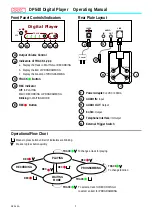
Crystal Vision
Introduction
DEC104S User Manual R1.0
4
29/10/04
The DEC104S is a 100mm x 266mm module, which fits in the all standard frames and
can be integrated with any boards from the company’s full product range. It uses the
single height RM01, RM23, and RM24, double height RM27 and triple height RM25 rear
connectors in Indigo and other Crystal Vision frames.
Operating modes
To provide optimum performance with a wide range of sources the DEC104S can operate
in a number of different modes.
Input modes
Description
10 bit comb PAL/NTSC
composite
Uses a line-based comb decoder, which mixes to simple decoder
when the comb would produce artefacts.
10 bit bandsplit PAL
composite
High quality analogue bandsplit mode provides best results when
PAL material is unsuitable for line-based comb.
10 bit Y/C (S-video)
Suitable for use with well-timed PAL sources.
8 bit composite
8 bit Y/C (S-video)
All 8 bit modes use a robust simple decoder. These highly tolerant
modes are particularly suitable for use with poorly timed sources
such as VHS recorders or satellite feeds.
Note:
The Y/C input filtering is designed for PAL, use the DEC102S for NTSC Y/C inputs.
Each operating mode has its own luminance and chrominance gain, offset and phase
settings and both 525 and 625 line standards have separate horizontal and vertical timing
settings. All these parameters are automatically maintained when power is cycled.
Output timing
Horizontal and vertical timing adjustments are provided that operate relative to one of
three analogue timing references. These are an external reference, the video input or an
internal free-running clock. The external reference can be video or composite syncs
although a composite black and burst plus 300mV syncs into 75 Ohm as per EBU N14-
1988 is preferred.
If no analogue reference is provided the board will either time itself relative to the
composite or Y/C video input in 10 bit modes, or it will time its output to a free running
clock in 8 bit modes.
A horizontal offset delay adjustment varies the timing of the input video relative to input
syncs and blanking in 10 bit mode whichever source is the active reference.
Audio follow pulse
To allow an audio delay to track the video delay through the DEC104S, a TTL level pulse
is provided. This audio follow pulse is available from GPI5 and the RM27 rear module.
This pulse is output every frame. The length of the pulse (the time between the rising and
falling edge) is the same as the delay through the synchroniser.






































